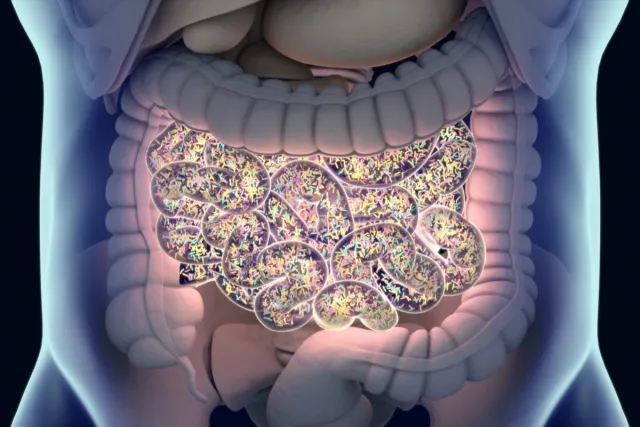This One Nutrient Could Be the Key to Fat Burn and Gut Health

Gut health has become a hot topic over recent years, and for good reason. Your gut is home to trillions of bacteria that impact everything from your immune function to your metabolism and even mental health. And when it comes to supporting your gut health, there's one essential nutrient that often gets overlooked: fiber.
Dietary fiber is a powerhouse nutrient found in plant foods that helps improve digestion, boost immune health, and reduce inflammation. But fiber isn't just one thing; it's a category that includes soluble fiber, which dissolves in water, and insoluble fiber, which doesn't. Both types are crucial for gut health. While fiber is most commonly associated with keeping things moving in the digestive tract, research shows fiber also helps maintain a balanced gut microbiome. According to a recent study published in Frontiers in Nutrition, eating a high-fiber diet is linked to a lower risk of chronic diseases like diabetes, heart disease, and colorectal cancer.
But how do you get more fiber into your diet, and which foods should you eat more of? To find out, we spoke with Caroline Young, RD, a registered dietitian and the owner of Whole Self Nutrition, who breaks down why fiber is so essential for gut health and how you can boost your fiber intake to help maintain a happy gut, improve digestion, and support your overall health.
(Next up: Discover the 10 Warning Signs You're Not Eating Enough Fiber.)
Fiber is a Non-Negotiable for Digestive Health

Insoluble fiber is found in whole grains, nuts, and vegetables, and helps move food through the gastrointestinal tract by adding bulk to stool, while soluble fiber, found in fruits and some vegetables, slows digestion by absorbing water and forming a gel-like substance.
"Fiber helps keep us regular, which is crucial for maintaining a healthy digestive system," Young explains.
Insoluble fiber is especially important because it keeps everything moving in your gut, helping to prevent constipation and keep you regular. Conversely, the Centers for Disease Control and Prevention says soluble fiber can help keep your blood sugar and cholesterol in check.
Fiber Boosts Immune Function

Young says that fiber "provides vital food for gut bacteria," which in turn supports your immune function. Your gut is home to a significant portion of your body's immune system, so keeping it healthy is critical for overall immune health. A 2022 study published in Nutrients found that fiber can help regulate the body's immune responses and reduce the risk of chronic inflammation.
Young says, "Higher dietary fiber intake is associated with improved gut microbiota, which can help prevent inflammatory conditions and support overall immune function."
Fiber Can Help You Lose Weight and Burn Fat

Studies suggest fiber is a valuable weight loss tool since it can reduce calorie intake and mindless snacking by helping you feel full for longer. While fiber doesn't speed up your metabolism per se, it's an essential nutrient for metabolic health as it can support healthy blood sugar levels, weight management, and gut health, all of which are interconnected with metabolism.
The Best Fiber-Rich Foods to Add to Your Diet

The best sources of soluble fiber include oats, beans, lentils, apples, carrots, and citrus fruits. Insoluble fiber can be found in foods like whole grains, brown rice, nuts, and vegetables like broccoli and cauliflower.
For optimal gut health, Young recommends incorporating a variety of fiber-rich foods into your meals. "Soluble fibers are primarily found in fruits and veggies, while insoluble fibers are mostly found in cereals and grains," she explains.
Fortunately, adding more fiber to your diet doesn't have to be complicated. Start by adding berries or a banana to your morning cereal or toast, and swap out refined grains for whole grains like quinoa and oats. Snack on nuts, seeds, or dried fruits, and add a vegetable to your meals at lunch and dinner. These simple changes can help you hit your daily fiber goals and improve your gut health.
Should You Supplement with Fiber?

While getting fiber from food is the best option for your gut health, some people may struggle to meet their daily fiber requirements through diet alone. In these cases, fiber supplements can help fill the gap. However, Young cautions, "Supplementing with fiber should only be done when necessary, and it's best to work with a healthcare provider to determine the best route for you."
If you're not meeting your fiber goals through food alone, supplements like psyllium husk or inulin can help, but food should always be the first choice for maximum health benefits, as some people may experience digestive discomfort from fiber supplements. Your goal should be to gradually increase your fiber intake from whole food sources to boost gut health, rather than relying on supplements.









